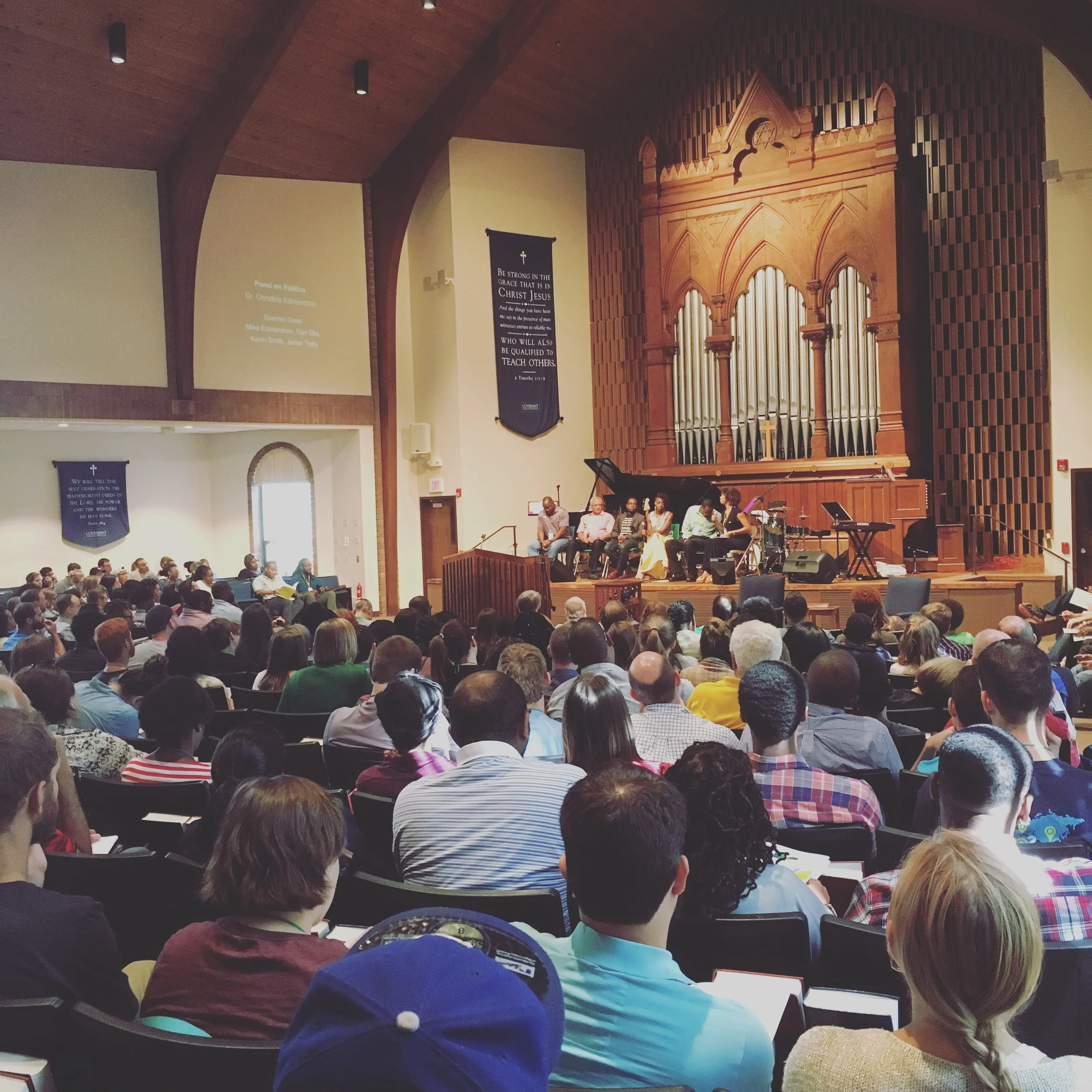For the second year in a row, we have had the privilege of attending the LDR weekend in St. Louis. For those of you not familiar with LDR, check out this video describing this wonderful conference:
Last year the theme was Orthodox Activism and this year it was Being and Becoming the Household of God. I learned so much this weekend, as I did last year, and appreciated the humble and godly leadership from the planning team. Here are my top 3 takeaways from this year:
#1- Embodied Theology
The theme focused both on being and becoming the household of God. Well, in order to be the household of God, we must be. By this I mean that we must live out the Christian faith in our embodied existence. God has created us both body and soul and we must not neglect one in our focus on the other. This sounds obvious, but it is something that the church has missed out on so often, not only in the early church battles with Gnosticism (an ancient heresy that had many ideas, but chiefly saw a dualism in the universe which meant the body was evil and the soul/spirit was good). We still battle this today and it comes out when we talk about creation, sin and redemption. Do we understand that the image of God in men and women is more than simply a spiritual reality, but a physical embodied reality? This means our bodies are intended to display the beauty and majesty of God. The diversity of skin color, body shape, hair style, facial features, height, and every other distinguishing characteristic is seen by God and cherished by him. We must not run to vague spiritualized colorblindness, but have a biblical embodied theology of creation and love the bodies of each man, woman, and child created in God's image.
But, before we jump too fast, we must know that sin is also embodied. We often see sin as an idea or vague personal idea that affects our souls and wounds our relationship with God. No doubt, sin affects our spiritual relationship with God, but, sin is committed in the body, against the body and by the body. This means I can't ignore the "secular" social sciences that teach about how our brains function with implicit biases. This means that the sins against any embodied image bearers should grieve me as it grieves God. It also means that any system and structure populated by sinners (hint: that is every system and structure) will be corrupted by sin in some real ways.
Finally, we must see redemption as embodied. When God came to earth in the person of his Son to save his people from their sin, he did so in an earthy way. Jesus came not as a spirit, but as a man. And a man with a culture, a skin color, a hair style, a language, an accent, and a set of customs. And he wasn't the desired body of his day according to Isa. 53:2, "For he grew up before him like a young plant, and like a root out of dry ground; he had no form or majesty that we should look at him, and no beauty that we should desire him." Jesus then suffered a real, physical, and excruciating death in his body. And then rose from the dead. Not merely as a spiritual idea or some sort of ghost. But physically. Paul sees this as the upmost importance, saying that if Jesus hasn't really risen from the dead physically, then the whole Christian faith is foolishness (1 Corinthians: 15). This means that our understanding of redemption has to move beyond simply "saving souls" with no regard to our bodies and to understanding that Jesus cares for both body and soul. This means holistically caring for the lives of people. This means we can't just "preach the gospel" without caring for justice, mercy, and "social things." This is because the gospel touches all these areas of life. Our theology must be embodied.
#2- The eschatological hope of glory
One of my favorite parts of this conference is when a speaker steps up to the mic for the first time and looks out upon the diverse crowd. They almost always note how beautiful this picture is from up there. This is the future that we, the church, belong to because of the work of Jesus. We will be a beautiful, redeemed, embodied, and diverse people from every nation, tribe, people, and language united in the worship of Jesus.
“After this I looked, and behold, a great multitude that no one could number, from every nation, from all tribes and peoples and languages, standing before the throne and before the Lamb, clothed in white robes, with palm branches in their hands, and crying out with a loud voice, “Salvation belongs to our God who sits on the throne, and to the Lamb!” And all the angels were standing around the throne and around the elders and the four living creatures, and they fell on their faces before the throne and worshiped God, saying, “Amen! Blessing and glory and wisdom and thanksgiving and honor and power and might be to our God forever and ever! Amen.””
Not only is this our future reality, but this future has broken into the present. Through the life, death, resurrection and ascension of Jesus, this future is our present. Not fully, but really. This is why the focus was on both being and becoming the household of God. Without this picture, we will not be able to move forward as a unique and as one pastor put it "peculiar" people. And with this picture, why is the church content with anything less? Why would we not spend our lives to experience as much of a foretaste of this heavenly glory as we can?
This is why every person talks about loving the worship at LDR!
#3- The work is hard, persevere my friends
With such an amazing vision, why doesn't every church embrace this and look like this? Well, there are many answers to that question, but one that I walked away from this weekend with was that its hard. Multiethnic church planting wasn't the entire focus of the conference but certainly a topic hit upon frequently. Many people are pursuing multiethnic church planting these days, and I pray its a movement of the Holy Spirit and not a fad. But, time will tell. If its a fad, it will fade quickly, because the work is hard. Entering into the work of racial reconciliation requires a lot of humility, flexibility, and repentance. It requires that we stop worrying about what people think about us and start worrying about our neighbor. It requires you to tackle the real and difficult topics of our day. It requires cross-cultural awareness. It requires love. And most of all it requires perseverance. Reconciling people to one another is just like reconciling people to God. It is overwhelming and impossible. Only God can do this miraculous work through the powerful blood of Jesus. In order to persevere in this work, we need each other, we need this eschatological vision, and we need to rely on the power of the Lord. So friends, lets persevere in this work, for God has purchased it and he will do it.
See you next year LDR.

